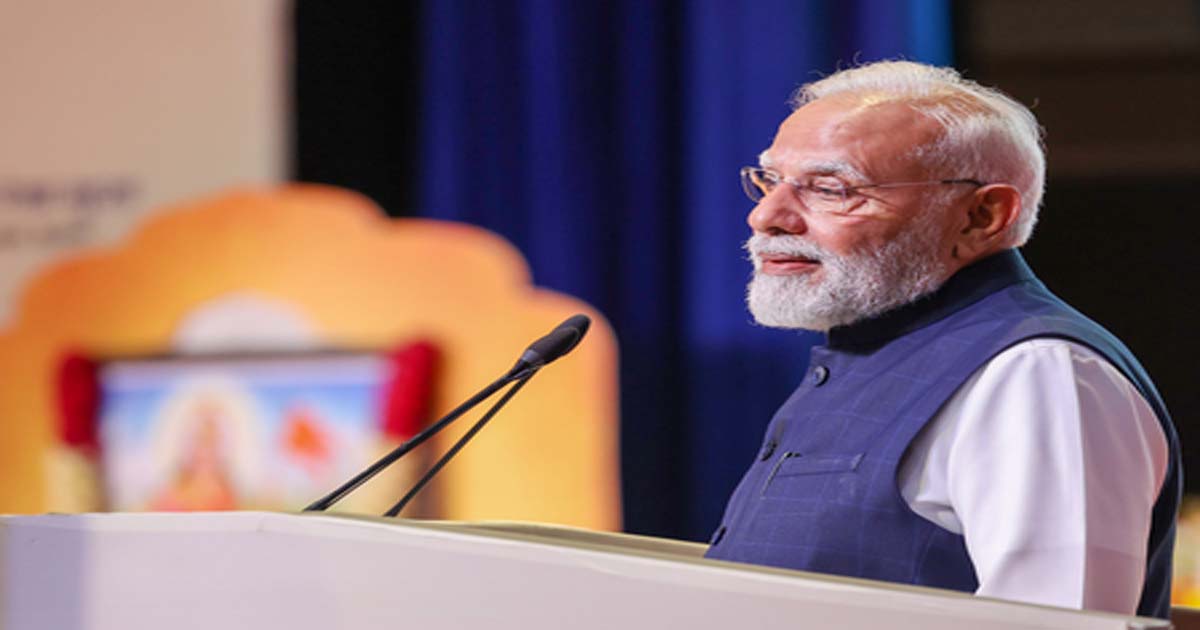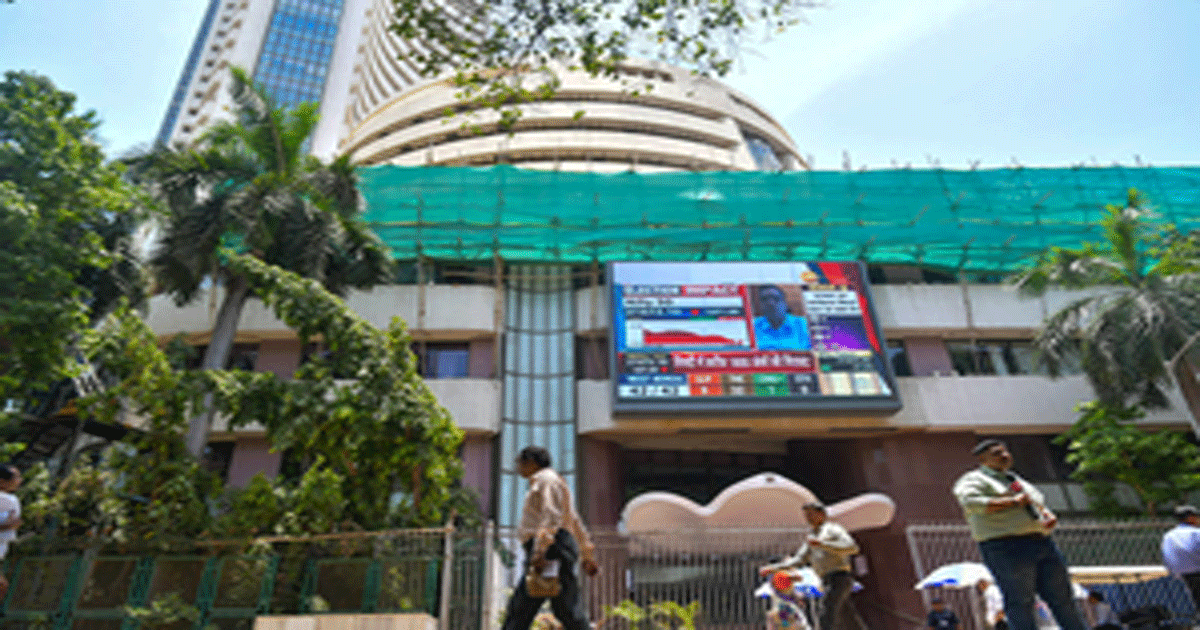Business
Committed to boosting Mumbai’s infrastructure, ease of living: PM Modi

Mumbai, Oct 8: Prime Minister Narendra Modi on Wednesday reaffirmed his government’s commitment to enhancing Mumbai’s infrastructure and the ‘Ease of Living’ as he is set to inaugurate Phase-1 of the Navi Mumbai International Airport (NMIA) and the Mumbai Metro Line-3.
In a post on X, PM Modi said, “On the way to Navi Mumbai to take part in the programme marking the inauguration of Phase-1 of the Navi Mumbai International Airport. With this, the Mumbai Metropolitan Region will get its second major international airport, thus boosting commerce and connectivity.”
“The final phase of the Mumbai Metro Line-3 will also be inaugurated. We are committed to enhancing Mumbai’s infrastructure and boosting ‘Ease of Living’ for the people of this dynamic city,” he added.
Phase-1 of the Navi Mumbai International Airport, developed at an estimated cost of Rs 19,650 crore, will be inaugurated by the Prime Minister in line with his vision of transforming India into a global aviation hub.
The Navi Mumbai International Airport is India’s largest Greenfield airport project, developed under a Public-Private Partnership (PPP) model. As the second international airport for the Mumbai Metropolitan Region, it will work in coordination with the Chhatrapati Shivaji Maharaj International Airport (CSMIA) to reduce congestion and position Mumbai among global cities with multi-airport systems.
Spread across 1,160 hectares, NMIA is designed to be one of the most efficient airports in the world, capable of handling up to 90 million passengers per annum and 3.25 million metric tonnes of cargo.
Among its standout features is an Automated People Mover (APM) system that will connect all four passenger terminals to facilitate smooth inter-terminal transfers. A landside APM will also link the city-side infrastructure, ensuring convenience for passengers and staff.
Committed to sustainability, the airport will include storage for Sustainable Aviation Fuel (SAF), solar power generation of nearly 47 MW, and electric bus services for city-wide connectivity. NMIA will also become the country’s first airport to be connected by a Water Taxi service.
In addition to the airport, PM Modi will inaugurate Phase 2B of the Mumbai Metro Line-3, which stretches from Acharya Atre Chowk to Cuffe Parade and has been constructed at an estimated cost of Rs 12,200 crore.
With this launch, the Prime Minister will dedicate the entire Mumbai Metro Line-3 (Aqua Line) to the nation. Built at a total cost exceeding Rs 37,270 crore, this milestone marks a major leap forward in the city’s urban transport infrastructure.
Mumbai Metro Line-3, the city’s first fully underground metro line, is set to redefine commuting in the Mumbai Metropolitan Region by offering faster, more efficient, and eco-friendly transport options for millions of daily commuters.
Business
Number of poor getting subsidised LPG under PMUY scheme touches 10.41 crore

New Delhi, Jan 6: Petroleum and Natural Gas Minister Hardeep Singh Puri said on Tuesday that as many as 10.41 crore LPG connections have already been provided for the supply of subsidised cooking gas to poor families under the Pradhan Mantri Ujjwala Yojana as the government steadily progresses to achieve its target of covering 10.6 crore families under the scheme.
Puri further stated that the Pradhan Mantri Ujjwala Yojana has succeeded in building a nationwide system that delivers clean cooking fuel reliably with every refill.
“Under the leadership of Prime Minister Narendra Modi, Ujjwala has transformed clean cooking from a welfare measure into a reliable everyday infrastructure,” the minister said in a post on X.
LPG is being made affordable for the poor through a targeted subsidy of Rs 300 per 14.2 kg cylinder for up to nine refills per year under the PMUY scheme. This intervention has resulted in a steady rise in LPG consumption. The average per capita consumption increased from about three refills in 2019-20 to 4.47 refills in FY 2024-25 and further to a pro-rated level of about 4.85 refills per annum during FY 2025-26, indicating sustained adoption of clean cooking fuel, according to figures compiled by the Ministry of Petroleum and Natural Gas.
To clear pending applications and achieve saturation of LPG access, the government approved the release of 25 lakh additional LPG connections during FY 2025-26. Subsidy targeting and transparency were improved with the acceleration of Aadhaar authentication. As on December 1, 2025, biometric authentication covered 71 per cent of PMUY consumers and 62 per cent of non-PMUY consumers, according to an official statement.
Consumer safety was strengthened through the nationwide Basic Safety Check campaign. More than 12.12 crore free safety inspections were conducted at customer premises, and over 4.65 crore LPG hoses were replaced at discounted rates, significantly enhancing awareness and safety standards in domestic LPG usage, the statement added.
Business
Sensex, Nifty post mild losses as oil and gas stocks trade lower

Mumbai, Jan 6: Indian benchmark indices posted mild losses on Tuesday, weighed down by losses in oil and gas stocks. Amid impressive corporate updates that had lifted expectations of stronger quarterly earnings, concerns of potential additional tariffs by US weighed on the domestic markets.
As of 9.30 am, Sensex slipped 246 points, or 0.29 per cent to 85,193 and Nifty eased 70 points, or 0.27 per cent to 26,180.
Main broad-cap indices performed almost in line with benchmark indices, with the Nifty Midcap 100 down 0.08 per cent, while the Nifty Smallcap 100 shed 0.02 per cent.
Immediate support lies at 26,100–26,150 zone, and resistance placed at 26,400–26,450 zone, market watchers said.
The US markets rallied overnight ignoring Venezuela crisis. As crude prices fall due to increased supply from Venezuela, the market appears to be betting that the Venezuela crisis will be positive in medium to long term, analysts said.
However, geopolitical surprises are likely, so it is too early to decide and investors should consider increasing their cash position, they added.
The banking sector have strengthened due to increasing credit growth, even though deposit mobilisation remains a challenge.
Asian defence stocks showed strong surge for a second straight session, even as the region traded mixed, with investors assessing geopolitical risks after the US attack on Venezuela.
In Asian markets, China’s Shanghai index added 1.14 per cent, and Shenzhen gained 0.79 per cent, Japan’s Nikkei added 0.69 per cent, while Hong Kong’s Hang Seng Index inched up 1.68 per cent. South Korea’s Kospi declined 3.99 per cent.
The US markets were mostly in the green zone on the last trading day even as Nasdaq added 0.69 per cent. The S&P 500 gained 0.64 per cent, and the Dow moved up 1.23 per cent.
On January 5, foreign institutional investors (FIIs) sold net equities worth Rs 36 crore, while domestic institutional investors (DIIs) were net buyers of equities worth Rs 1,764 crore.
Business
India pushing ahead to diversify exports amid US tariff turmoil: Report

New Delhi, Jan 5: When India reached a free-trade agreement with New Zealand in a record time of nine months towards the end of December, this was a clear signal of New Delhi’s plan to diversify the country’s exports away from the US and this approach is expected to gather pace going ahead, according to an article in the South China Morning Post.
The article highlights that ever since US President Donald Trump imposed penal import tariffs of 50 per cent on India last year, New Delhi has maintained a resolute approach to the punitive levies, even as it has kept the door open to negotiations.
The article points out that the trade deal with New Zealand last month was the third such deal that came close on the heels of the free trade agreements with the United Kingdom and Oman.
The US is India’s largest export market, receiving about 18 per cent of its total goods exports, including items such as garments and leather products, with a vast diaspora readily snapping up products shipped from their homeland.
While it remains unclear whether the two countries can negotiate a trade deal given India’s firm position on opening sensitive sectors such as agriculture and dairy to US products, experts are sceptical that Washington will significantly roll back its tariffs, the article states.
However, it observes that India is not putting all its eggs in the US basket and is actively seeking free trade pacts with other countries to diversify its export markets amid the uncertainty created by the Trump administration.
Commerce Secretary Rajesh Agrawal has already said that India’s effort to diversify trade across geographies and sectors is paying off. There is positive export momentum that is likely to consolidate in the coming months.
The article also highlights that India’s exports in 2025 showed strong resilience and growth, reaching a record US$825.25 billion in the financial year 2024-25. The robust growth has continued into the current financial year, with exports in the April to November period rising 5.43 per cent to US$562.13 billion.
-

 Crime3 years ago
Crime3 years agoClass 10 student jumps to death in Jaipur
-

 Maharashtra1 year ago
Maharashtra1 year agoMumbai Local Train Update: Central Railway’s New Timetable Comes Into Effect; Check Full List Of Revised Timings & Stations
-

 Maharashtra1 year ago
Maharashtra1 year agoMumbai To Go Toll-Free Tonight! Maharashtra Govt Announces Complete Toll Waiver For Light Motor Vehicles At All 5 Entry Points Of City
-

 Maharashtra1 year ago
Maharashtra1 year agoFalse photo of Imtiaz Jaleel’s rally, exposing the fooling conspiracy
-

 National News1 year ago
National News1 year agoMinistry of Railways rolls out Special Drive 4.0 with focus on digitisation, cleanliness, inclusiveness and grievance redressal
-

 Maharashtra1 year ago
Maharashtra1 year agoMaharashtra Elections 2024: Mumbai Metro & BEST Services Extended Till Midnight On Voting Day
-

 National News1 year ago
National News1 year agoJ&K: 4 Jawans Killed, 28 Injured After Bus Carrying BSF Personnel For Poll Duty Falls Into Gorge In Budgam; Terrifying Visuals Surface
-

 Crime1 year ago
Crime1 year agoBaba Siddique Murder: Mumbai Police Unable To Get Lawrence Bishnoi Custody Due To Home Ministry Order, Says Report












